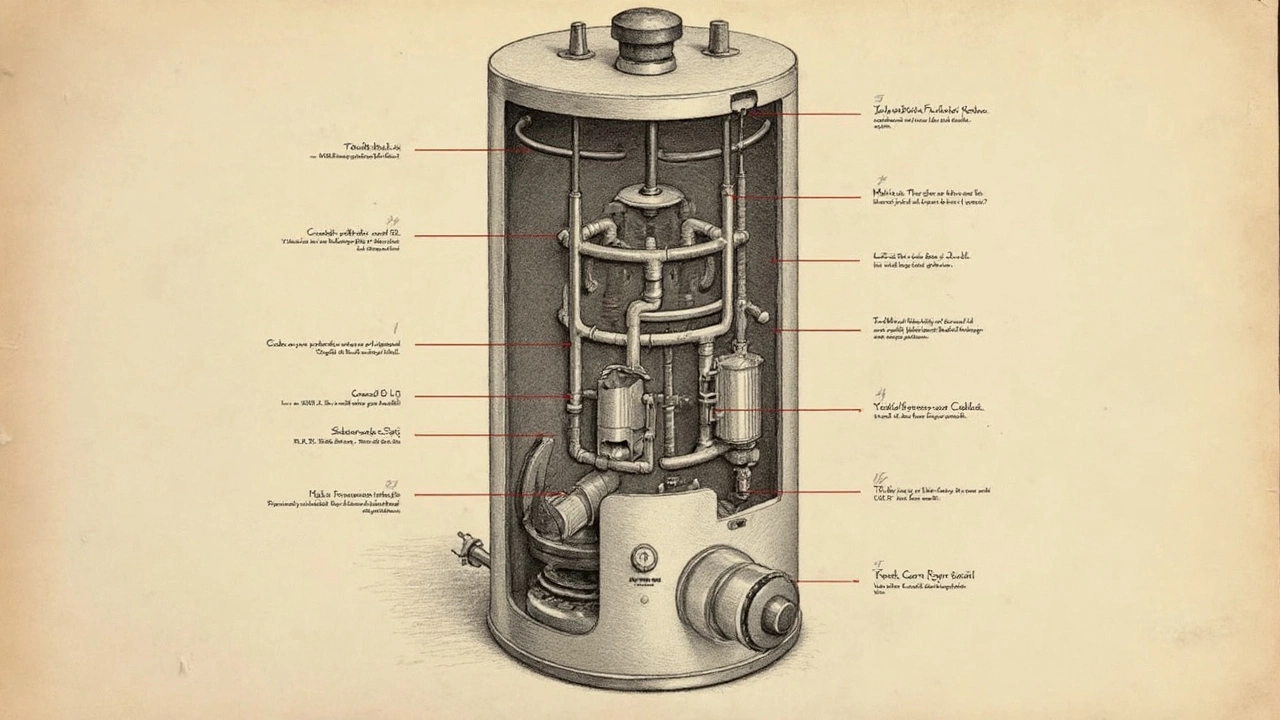Picture this: You step into the shower, ready to enjoy a steamy start to your day, and bam! Cold water hits you like a slap in the face. What gives? Before you throw in the towel, it might just be a simple reset that's needed. But how do you know when your water heater is screaming for attention?
First things first, check for signs of trouble. Is the water lukewarm even at the highest setting? Or maybe there's no hot water at all? Strange noises or an unusual delay in heating could also be red flags. These could be nudging you to hit that reset button.
Once you spot these hints, the good news is that resetting your water heater usually isn't rocket science. With a little know-how and a couple of straightforward steps, you can handle it without breaking a sweat. And hey, if the issue persists, you'll learn when it's time to call in the pros.
- Signs Your Water Heater Needs a Reset
- How to Reset Your Water Heater
- Common Water Heater Problems
- When to Call a Professional
Signs Your Water Heater Needs a Reset
Is your water heater acting up? Recognizing the signs early can save you from unnecessary headaches. Here’s what to watch for:
One major hint is when your water's not heating up properly. If your shower delivers all the chills and none of the thrills, and the water is lukewarm at best, it might be time to consider a reset. This means your heater's internal processes might be on the fritz.
But wait, there’s more! Strange noises coming from your unit? A symphony of bangs, pops, or hisses isn't normal. These sounds often mean there's sediment build-up or internal components are out of sync, both of which might be solved with a quick reset.
Ever noticed an unpleasant delay in shower temperatures getting hot? You turn on the tap and nothing but cold flows out for what feels like an eternity. This can signal that something’s amiss.
- No hot water? If turning the dial to maximum hot isn’t doing the trick, there’s a decent chance your water heater needs a break—and a reset might just be the TLC it needs.
- Rapid cycling? If your heater’s on and off more than a light switch, that’s a red flag. It could be struggling to maintain temperature, often fixable by a simple reset.
Remember, while a reset can solve some issues, it's not a cure-all. If you notice corrosion, leaks, or an extremely old unit, a reset may just be a bandaid on a bigger problem. In those cases, consider calling in a professional to give your setup a proper once-over.
| Water Heater Issue | Reset Needed? | Other Action |
|---|---|---|
| No Hot Water | Yes | Check thermostat settings |
| Strange Noises | Yes | Inspect for sediment build-up |
| Unpleasant Delay | Yes | Consider professional inspection |
How to Reset Your Water Heater
Ready to try fixing your water heater yourself? Resetting it isn't too complicated, even if you're not a tech wizard. This simple process can often solve those pesky hot water issues and save you a call to the plumber.
Before you begin, make sure you turn off the power at the breaker. Safety first! Now, let's get down to business.
- Find the reset button on your water heater. It’s usually a small red button located on the upper thermostat of an electric water heater. It might be hidden under a removable panel.
- Press and release the reset button. You might hear a click, which is usually a good sign that it's reset.
- After resetting, switch the power back on at the breaker.
- Wait for about 30 minutes, then check if you've got hot water flowing.
If these steps don't bring any warmth back to your showers, it might be time to look deeper or call in a pro. As Mark Stevens, a seasoned plumbing expert, shared,
“If a simple reset doesn’t do the trick, the problem could be more complex, possibly involving the thermostat or heating elements.”
Inconsistent power supply or a faulty thermostat might keep causing these resets, so keep an ear out for any unusual noises or a frequent need to reset. If the problem keeps recurring, don’t wrestle with it alone.
For those curious about how long their water heater might last, here's a quick look:
| Type of Water Heater | Lifespan (years) |
|---|---|
| Electric | 10-15 |
| Gas | 8-12 |
Keeping an eye on the age of your unit is always a good idea. But don't fret, with a bit of maintenance, your water heater can provide long years of comfort.

Common Water Heater Problems
Your water heater might act up for various reasons, and it's essential to recognize what's bugging it. Understanding these issues can save you a lot of headaches and sometimes even your hard-earned money.
One common problem is the dreaded no-hot-water dilemma. If you’ve turned the tap and nothing but cold water comes out, it could be due to a tripped breaker or a faulty thermostat. In older models, a worn-out heating element could be to blame.
Ever noticed your water heater making strange noises, like clanking or popping? That might be due to a buildup of sediment at the tank's bottom. Over time, minerals settle, creating a layer of gunk that insulates the water from the heating elements. This not only affects efficiency but also puts more strain on the system.
Another issue you might encounter is leaks. It’s a telltale sign something’s not right, usually because of corrosion or pressure build-up. It's vital to address leaks immediately to avoid water damage or, worse, the entire tank failing.
There's also the problem of smelly or discolored water. If your hot water has got a weird scent—kind of like rotten eggs—it might be bacteria growing in the tank. Discolored water often signals corrosion inside the tank, especially in places with hard water.
| Problem | Possible Cause |
|---|---|
| No Hot Water | Tripped Breaker, Faulty Thermostat, Worn Heating Element |
| Noisy Operation | Sediment Build-Up |
| Leaks | Corrosion, Pressure Issues |
| Smelly/Discolored Water | Bacterial Growth, Corrosion |
If any of these issues sound familiar, a quick water heater reset might do the trick. But remember, regular maintenance is key to preventing these problems in the first place. Drain and flush your tank occasionally to keep sediment at bay, and inspect your system regularly for any signs of wear and tear.
When to Call a Professional
Alright, so you've tried the reset button, and your water heater is still acting up. It's frustrating, I know. But this is where it's smart to call in the pros. Let’s face it, when it comes to some water heater issues, a DIY fix might not cut it.
First off, if there's water leaking from your unit, it's a red-alert situation. Leaks can cause a range of problems, not just for your water heater but for your home as well, leading to water damage or even mold. It's definitely time for a professional touch.
If you hear strange noises, like banging or popping, it could indicate sediment build-up inside the tank. While a little sound is normal, loud or consistent noises might mean it's time to get a professional to flush the system or replace it if it's too far gone.
Another signal? Frequent tripping of the circuit breaker. This isn't something to ignore, as it could point to electrical issues, a faulty thermostat, or more complex problems waiting to escalate. Leave that to experts to avoid any shocking surprises.
If you've got an old unit, especially if it's over 10 years old, and you find yourself resetting more than once, consider consulting a pro about replacement options. Upgrading to a more efficient model could save you money in the long run.
Lastly, any signs of rust in the water are immediate cause for concern. Rust could mean the tank is corroding from the inside, and unless you’re planning on some unpleasant surprises, a professional should step in and assess the situation.
| Issue | Why You Need a Pro |
|---|---|
| Water Leaks | Avoids damage and potential mold issues. |
| Strange Noises | May indicate sediment build-up or tank damage. |
| Circuit Breaker Trips | Points to serious electrical problems. |
| Old Unit | An efficient upgrade could save costs on energy. |
| Rusty Water | Signals internal corrosion needing urgent attention. |
So, keep these signs in mind. It's worth it in the long run to rely on someone who knows their stuff. Their expertise not only fixes current issues but also prevents future headaches.


